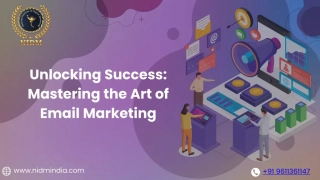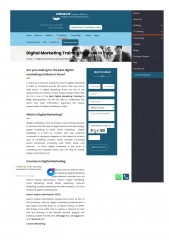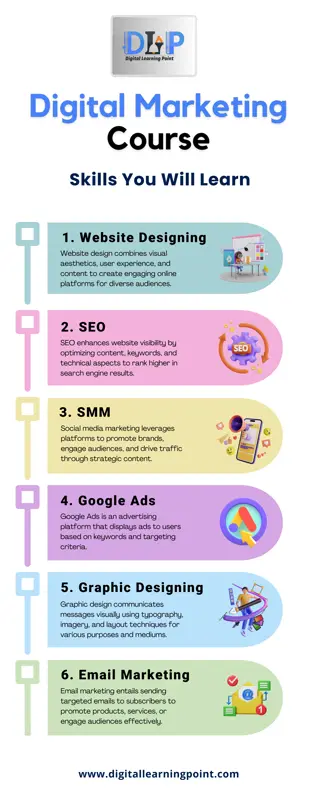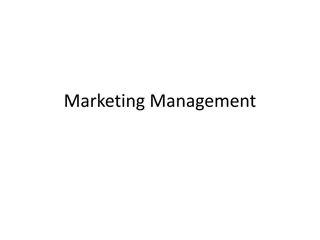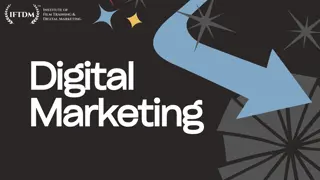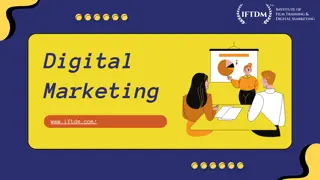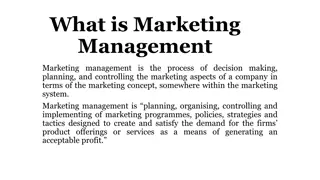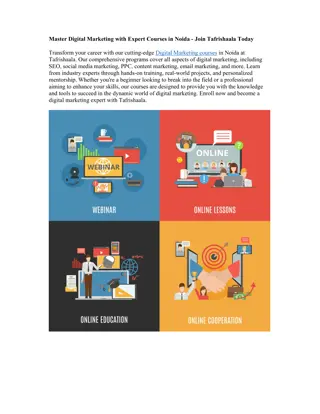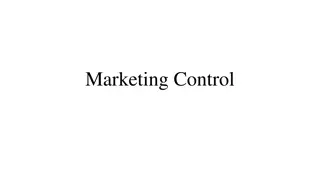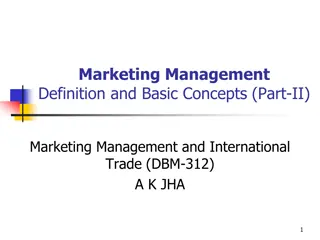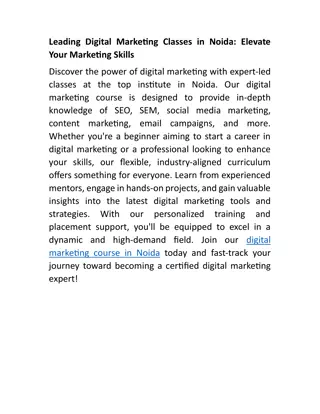Marketing Planning
A marketing plan is crucial for directing and coordinating marketing efforts at both strategic and tactical levels. It involves strategic target decisions, value proposition analysis, and various tactical elements like product features, promotion, pricing, and sales channels. Strategic planning processes include defining corporate mission, establishing strategic business units, and assessing growth opportunities. Good mission statements focus on key goals and values. Sample mission statements from companies like Marriott and Infosys demonstrate commitment to excellence. Creating strategic business units involves understanding their characteristics.
Download Presentation

Please find below an Image/Link to download the presentation.
The content on the website is provided AS IS for your information and personal use only. It may not be sold, licensed, or shared on other websites without obtaining consent from the author.If you encounter any issues during the download, it is possible that the publisher has removed the file from their server.
You are allowed to download the files provided on this website for personal or commercial use, subject to the condition that they are used lawfully. All files are the property of their respective owners.
The content on the website is provided AS IS for your information and personal use only. It may not be sold, licensed, or shared on other websites without obtaining consent from the author.
E N D
Presentation Transcript
What is a Marketing Plan? A marketing plan is the central instrument for directing and coordinating the marketing effort. It operates at a strategic and tactical level.
Levels of a Marketing Plan Strategic Target marketing decisions Value proposition Analysis of marketing opportunities Tactical Product features Promotion Merchandising Pricing Sales channels Service
The Strategic Planning, Implementation, and Control Processes
Corporate And Division StrategicPlanning Defining the corporate mission Establishing strategic business units Assigning resources to each SBU Assessing growth opportunities
Defining the corporate mission Mission statement includes the mission of an organization which it needs to achieve through careful marketing research by carefully analyzing the needs and wants of customer and providing him with the same.
Good Mission Statements Focus on limited number of goals Stress major policies and values Define major competitive spheres Take a long-term view Short, memorable, meaningful
Sample Mission Statements MARRIOTT S Mission Statement: We are committed to being the best lodging and food service company in the world, by treating employees in ways that create extraordinary customer service and shareholder value
Cont. Biocon To be an integrated biotechnology enterprise of global distinction. Infosys TechnologiesLimited To achieve our objectives in an environment of fairness, honesty, and courtesy towards our clients, employees, vendors and society at large.
Establish strategic business units (SBUs) Characteristics of SBUs It is a single business or collection of related businesses It has its own set of competitors It has a leader responsible for strategic planning and profitability
Product Orientation vs. Market Orientation Company Product Market Missouri-Pacific Railroad We run a railroad We are a people- and-goods mover Xerox We make copying equipment We improve office productivity Standard Oil We sell gasoline We supply energy Columbia Pictures We make movies We entertain people
Assign resources to each SBU The Strategic Planning Gap
Assess growth opportunities Ansoff s Product-Market Expansion Grid
SWOTAnalysis Strengths Weaknesses Opportunities Threats
SWOTAnalysis INTERNAL FACTORS past and present EXTERNAL FACTORS past and present ACTION STRENGTHS OPPORTUNITIES Exploit them if possible Build on them, Emphasise in promotional campaigns Need to be identified and researched environmental and analysis via scanning WEAKNESSES Eliminate them if possible, Circumvent them THREATS Develop plans contingency Must Marketing Plan decisions be addressed by
Market Opportunity Analysis (MOA) Can the benefits involved in the opportunity be articulated convincingly market? Can the target market be located and reached with cost-effective media and trade channels? Does the company possess or have access to the critical capabilities and resources needed to deliver the customer benefits? to a defined target
MOA (cont.) Can the company deliver the benefits better than any actual or potential competitors? Will the financial rate of return meet or exceed the company s required investment? threshold for
Goal Formulation Hierarchically arranged from the most to the least important. Quantitative objectives whenever possible Objectives should be realistic Objectives must be consistent
Strategic Formulation Porter s Generic Strategies Overall Cost Leadership Differentiation Focus
Feedback And Control Measures include: Performance measurements Evaluation mechanisms Feedback mechanisms Contingency planning Budgets / profit & loss
Problems with Planning Companies become obsessed with the process or technique rather than the actual content and delivery of the plan!! Unreliable or insufficient market research data can make plans flawed from beginning!
Problems with Planning (Cont.) New companies too busy? Small companies not important/ no skills/ restrictive? Mature companies Unnecessary / cumbersome? Fast changing markets not useful / responsive? However all organisations should plan!
Marketing Planning is Essential ... Conflicting pressures make choices difficult Enhancing customer service Increasing profitability Vs. Long-term value creation Short-term profit Vs. Revenue maximisation Vs. Cost minimisation




